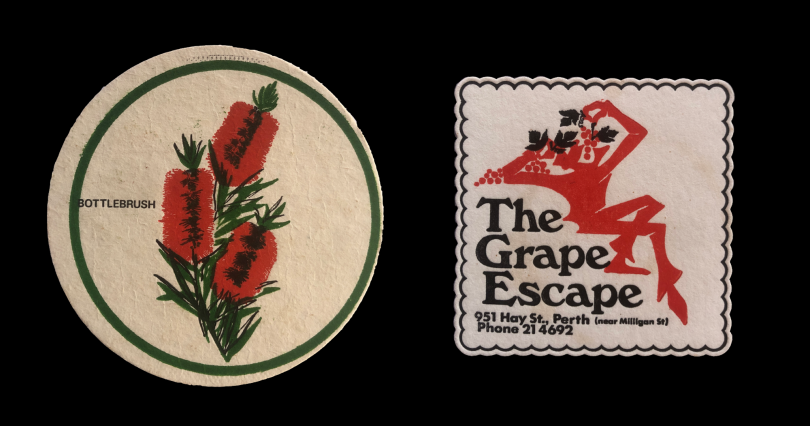Who would have known the strict coronavirus lockdown announced in late March would result in people finding stones picked up in ANZAC Cove, retro beer coasters collected in the 1980s, childhood diaries professing a love of Delta Goodrem and wads of cash hidden in birthday cards.
When the federal government announced people’s daily commutes had to change from a bus and a tram to the six steps it took to get from our beds to our desks, many Australians became intimately familiar with their homes and the best walking tracks within a five-kilometre radius.
For Tommy Rogers from Perth, that meant setting up his disused desk to become his daily working space.
“I don’t work from home that often – this is the first time in a long time I’ve actually sat down at that very desk,” Tommy said.
But whilst cleaning out his desk drawers in April to prepare for his foray into working-from-home life, Tommy came across a stone he collected while visiting ANZAC Cove as a young traveller.
“Pretty gutted I didn’t know where it was, and now I’ve found it,” he said.
The find prompted Tommy to look back on how lucky he’d been to travel the world and, with the global pandemic starting to ramp up across the globe, generated a bigger discussion with himself about what was important to him in his life.
“I have thought a little bit more nostalgically about things that are a bit more meaningful,” he said.
“The things that matter to you sometimes mean more in crises than they do when you’re just going to your work day-to-day.”
Tommy wasn’t the only one wistfully looking back on better times during the crisis.
Online hordes devoured the #Meat20 craze, #throwbackthursday pics posted on days other than Thursdays and cult classics on streaming services during lockdown.
Embarrassing I know, but this is from my 21st (nearly 20). #MeAt20 pic.twitter.com/sxMj290kBd
— Gladys Berejiklian (@GladysB) April 18, 2020
And like Tommy, several other Australians used objects from around their homes as excuses to reminisce.
Melburnians Becky and Sarah both scored extra cash while perusing through old birthday cards.
John from Perth came across beer coasters he’d accrued during his travels and shared some of the stories they held with his son.
And Nicole from Wollongong found a childhood diary filled with embarrassing anecdotes she could share with old and new friends alike.

Nicole found an old diary while stuck at home. (Supplied: Chris Moir)
But what spurred everyone’s desire to look back? To reminisce? What did we all gain from an afternoon of nostalgia?
According to psychologists, it all came down to individuals needing to find meaning and a way to connect during a time of heightened fear.
University of Queensland social psychology research Jolanda Jetten said all of us were looking for ways to cope with the fears of the virus and the loss of our regular day-to-day routines to keep us going.
“We faced a massive threat, we felt cut off from the sources that we would normally turn to when we feel threatened, and by breaking with the normal day-to-day routine, we found ourselves wondering more about how we fill our days,” Jetten said.
“To know where you are going, people often look back and consider how they got to where they are. So, that can lead to nostalgia and thinking about the past.”
But why objects? Why do so many of us hold onto old cards and photos so we can wistfully remember the good old days?

Old birthday cards were a common way for people to connect with good memories while stuck indoors. (Credit: Pexels)
RMIT psychology researcher James Collett – who’s studied compulsive hoarding, attachment and communities of collectors – said many people collect as a way to create orderliness, as well as a preservation of the past and the cozy blanket of security it can create.
“Collecting can provide a sense of order, and also puts us in touch with our memories of past experiences. This gives us a sense of identity and of emotional security,” Collett said.
Did Collett think our proclivities to look back on the past through old keepsakes could help us stay connected during crises?
“Definitely, shared past experiences are a big part of what draws communities of collectors together,” he said.
“Often, just as much as specific collectibles are discussed, groups will often focus on the era that their collection represents.”
Now the worst of the pandemic has – hopefully – passed in Australia, you shouldn’t feel guilty if you passed on learning a new language, knitting jumpers for your friends, or doing a daily online Zumba session where strangers across the world could see your sweat drip as you unsuccessfully tried to keep up with far-too-advanced dance moves.
Maybe the best way to cope during the lonely days at home was to look back on the happy days of our past, as a way to look forward to the great days still to come.
FEATURE IMAGE: During the coronavirus lockdown, John Woods from Perth found coasters he collected in the 70s. The lockdown saw many people look back to the past as a way to cope with the present. (Credit: Kelly Fliedner)

